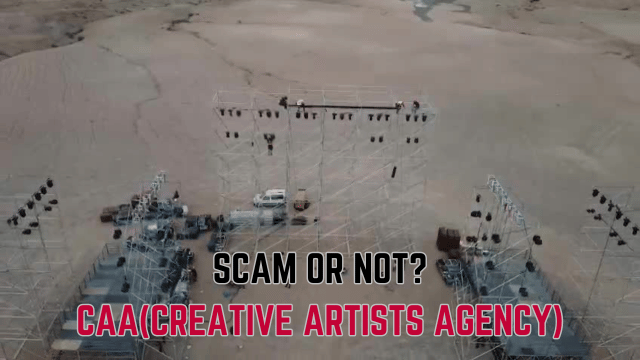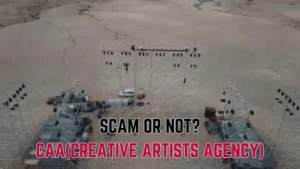Sabotage Festival Scandal: Unraveling the Mystery Behind the Unexpected Cancellation
Introduction
In the world of music festivals, few events have stirred as much controversy and confusion as the recent cancellation of Sabotage Festival in Morocco. What was meant to be a groundbreaking celebration of electronic music in the heart of Marrakech has instead become a cautionary tale of miscommunication, alleged misconduct, and shattered dreams. Let’s dive deep into the Sabotage Festival scandal and uncover the truth behind this unexpected turn of events, and the crucial role played by CAA (Creative Artists Agency) in this cancellation.
Background of Sabotage Festival Morocco
The Vision Behind Sabotage Marrakech
Sabotage Festival was conceived as a game-changing event for Morocco’s music scene. Scheduled for May 30-31 and June 1, 2024, it promised to transform the picturesque Agafay Desert near Marrakech into an oasis of pulsating beats and unforgettable melodies. The organizers envisioned Sabotage Morocco as more than just a music festival; it was to be a cultural bridge, putting Morocco on the map as a premier destination for electronic music enthusiasts worldwide.
Star-Studded Lineup and Expectations
The anticipation for Sabotage Festival reached fever pitch with the announcement of its impressive roster of international DJs and electronic music artists. Headliners like Monolink, WhoMadeWho, Jan Blomqvist, Kasablanca, Mind Against, Mathame, and Deer Jade were set to grace the desert stages, drawing fans from across the globe. The excitement was palpable, with tickets selling fast and social media buzzing with plans and expectations for what many believed would be the music event of the year in North Africa.
The Shocking Cancellation
Timeline of Events
Just days before some artists from CAA started calling Sabotage a scam on their Instagram stories, which sparked uproar and unrest among clients, some artist like Arymé a Moroccan DJ who have been paid already have quickly followed the wave by calling them a scam too (without any proof), sadly, the unthinkable happened. Festival organizers announced the event’s cancellation, sending shockwaves through the music community. The timing couldn’t have been worse, with many attendees already on the road to Marrakech or making final travel arrangements.
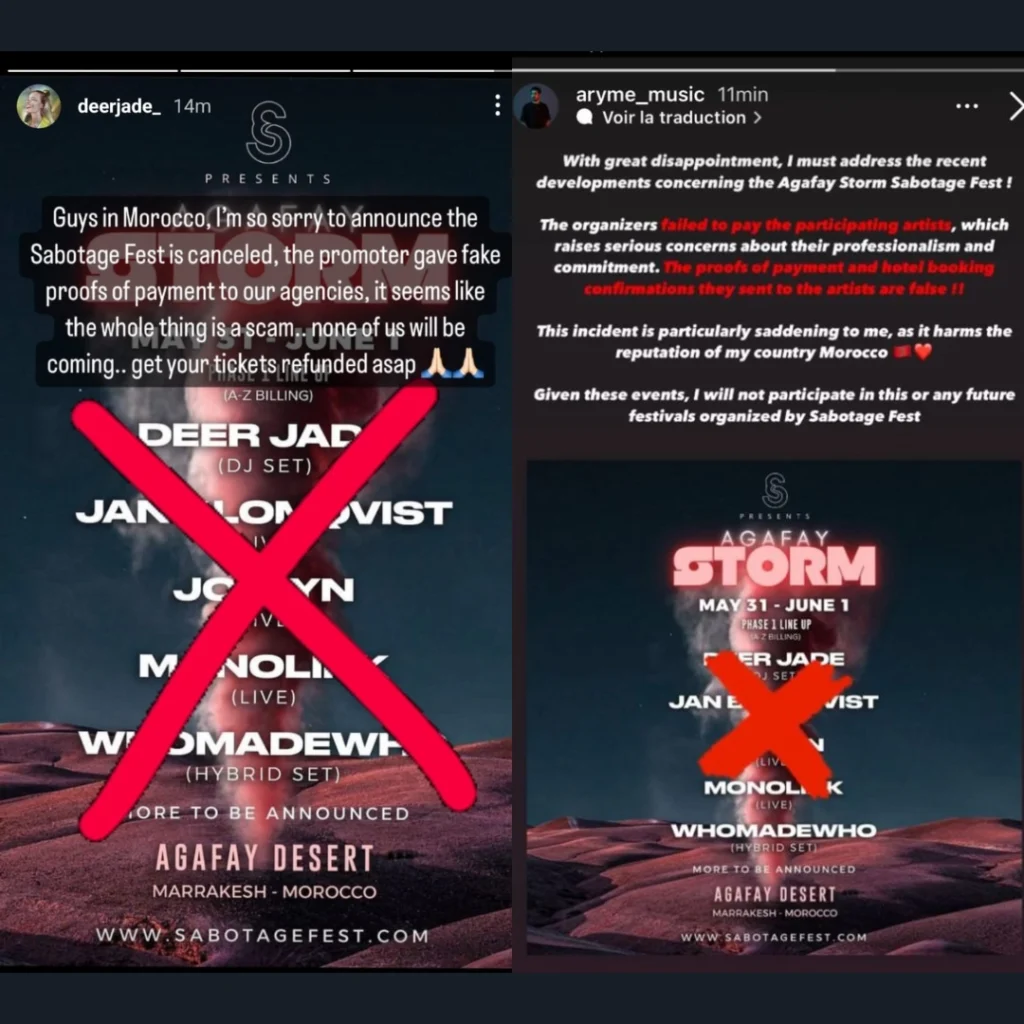
Initial Reactions and Confusion
The cancellation of Sabotage Festival sparked immediate confusion and outrage. Fans took to social media, demanding explanations and refunds. Local businesses in Marrakech, who had been preparing for the influx of festival-goers, were left reeling from the sudden loss of expected revenue. In the absence of clear information, rumors began to swirl about the reasons behind the cancellation.
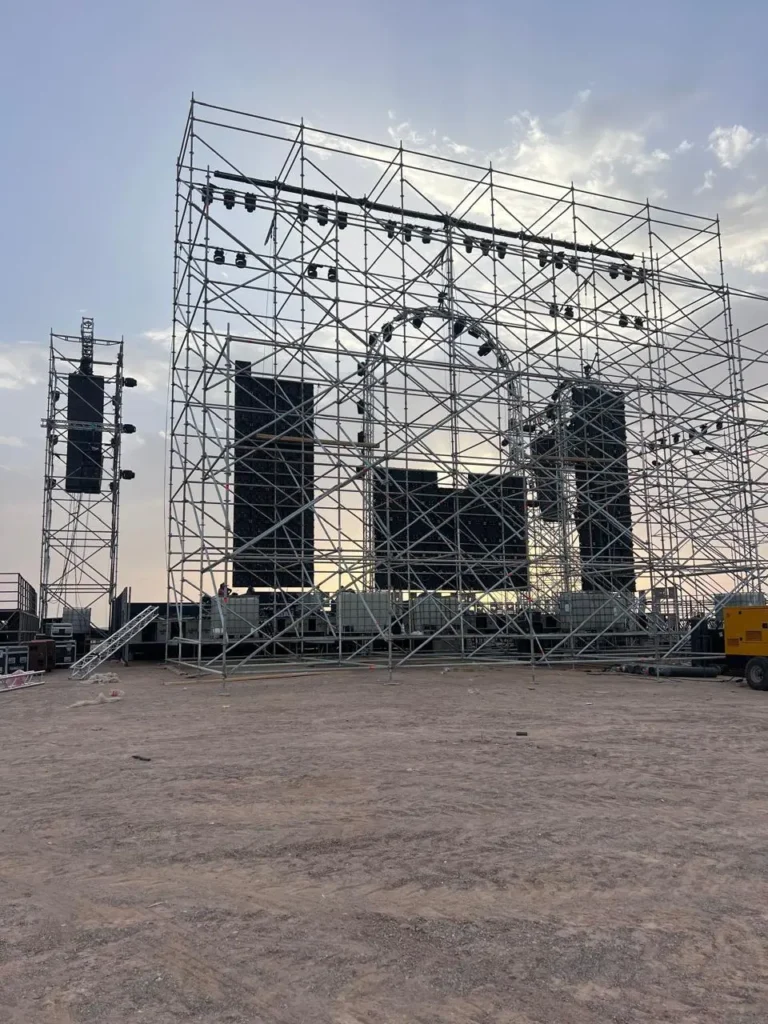
Uncovering the Truth
The Promoter's Revelation
In a stunning turn of events, the festival promoter came forward with irrefutable evidence that turned the narrative on its head. Bank statements and transfer receipts were presented, showing that all agreed-upon fees for Sabotage Marrakech had been paid in full to the Creative Artists Agency (CAA), which represented many of the festival’s headliners.
The Role of Creative Artists Agency (CAA)
The revelation about CAA’s involvement added a new layer of complexity to the Sabotage Festival scandal. Despite receiving full payment for the artists, the agency allegedly failed to inform them of this fact or release the funds. This breakdown in communication appears to be the true catalyst for the festival’s collapse, rather than any financial impropriety on the part of the Sabotage Morocco organizers.
The reason why the artists labeled the event as a “scam” remains mysterious to this day. Did CAA fail to inform its artists about the receipt of the funds? Was this a deliberate act of sabotage against the Sabotage Festival? These questions are worth asking, given that all payments had already been made before the artists made these statements.
The Deafening Silence of Artists
Speculations and Theories
As the controversy unfolded, one aspect became increasingly puzzling: the silence of certain artists who were scheduled to perform regarding the receipt of the funds. Deer Jade was the first to post a story labeling the festival as a scam, followed later by Joplyn.
Jan Blomqvist sent messages to some attendees via Instagram, stating that the festival was a scam and was never confirmed, which is not true, given that the event was clearly confirmed, as evidenced by the artists’ comments on the event’s flyers on Instagram.
This silence from the other artists fueled further speculation and allowed misinformation to flourish. Why have the same artists who labeled the festival a scam not publicly corrected their statements until now by acknowledging that they had received the funds? This behavior is especially disappointing, as it is not what one would expect from renowned artists.
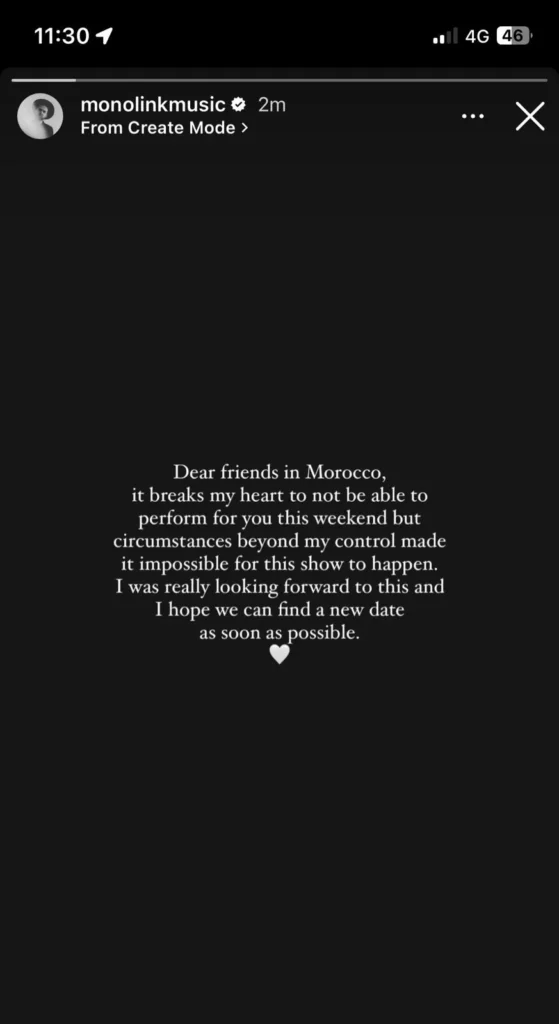
Impact on Artist Reputations
The artists’ continued silence in the face of mounting evidence has become increasingly problematic. Many fans and industry insiders argue that these performers have an ethical responsibility to address the situation, particularly given the damage done to Morocco’s reputation as a festival destination. The lack of public statements from the artists has led some to question their integrity and commitment to their fan base.
Sabotage Morocco's Impact on the Music Industry
Trust Issues in Festival Organization
The Sabotage Festival scandal has shed light on the complex web of relationships between festival organizers, talent agencies, and artists. It has raised serious questions about transparency and accountability in the music festival industry. Many are now calling for stricter regulations and more direct communication channels between all parties involved in organizing large-scale music events. (this happens especially with the MENA region as are new entry markets)
Rethinking Artist-Agency Relationships
This incident has also sparked a debate about the role of talent agencies in representing artists. The apparent failure of CAA to properly manage the financial transactions and communications for Sabotage Marrakech has led many to question the current model of artist representation. There’s a growing call for artists to take more direct control over their bookings and financial arrangements.
Legal Ramifications
Sabotage Festival's Legal Action
In a firm move, the organizers of Sabotage Morocco have initiated legal measures to recoup their losses and restore their reputation. They are seeking full refunds for all payments made to artists through CAA, as well as compensation for the damage inflicted on the Sabotage Festival brand. However, due to CAA holding the money, the promoters couldn’t refund everyone promptly and had to delay refunds. To demonstrate trust and appreciation for their fans, they also requested that CAA provide the same lineup for a free party for those who had already purchased their last ticket. This legal confrontation could have far-reaching implications for how disputes in the music festival industry are handled in the future.
Potential Industry-Wide Consequences
The outcome of this legal action could set a precedent for increased accountability in the music festival industry. It may lead to more robust contracts, clearer communication protocols, and better protection for festival organizers against unfair practices by agencies or artists. The Sabotage Festival case could potentially reshape the legal landscape for music event organization.
The Future of Music Festivals in Morocco
Rebuilding Trust in Sabotage Marrakech
Despite the setback, there’s hope for the future of Sabotage Festival and other music events in Morocco. The transparency shown by the organizers in presenting evidence and pursuing legal action has garnered support from many in the industry. However, rebuilding trust will require a concerted effort from all stakeholders, including clear communication with potential attendees and a commitment to learning from past mistakes.
Lessons Learned for Future Events
The Sabotage Festival scandal has provided valuable lessons for the entire music industry. Future events in Morocco and beyond will likely see increased due diligence, more transparent financial transactions, and clearer communication channels between organizers, agencies, and artists. This could lead to a more robust and trustworthy festival ecosystem, benefiting fans, artists, and host countries alike.
Conclusion
The cancellation of Sabotage Festival Morocco serves as a wake-up call for the music industry. It highlights the need for greater transparency, improved communication, and a renewed commitment to ethical practices from all parties involved in organizing and performing at music festivals. While the immediate impact on Morocco’s music scene has been significant, this scandal could ultimately lead to positive changes in how large-scale music events are planned and executed.
More information comes to light, the music community will be watching closely. The lessons learned from the Sabotage Festival scandal have the potential to create a more accountable and trustworthy industry, ensuring that future events can deliver on their promises to both artists and fans.
FAQs
The reasons for the artists silence remain unclear. It could be due to legal advice as b, contractual obligations, or other factors not yet made known to us.
The festival organizers have stated their intention to refund ticket holders, but the process may take more time due to the CAA’s retention of the funds.
The incident has undoubtedly damaged Morocco’s image in the short term, but transparent handling of the situation could help rebuild trust in the country’s ability to host large-scale music events.
Industry professionals are calling for increased transparency, direct communication channels, and clearer guidelines for all parties involved in organizing music festivals.
Yes, the scandal could prompt the industry to adopt more stringent regulations and improved communication practices, ensuring that future events are better managed and more reliable for attendees.

